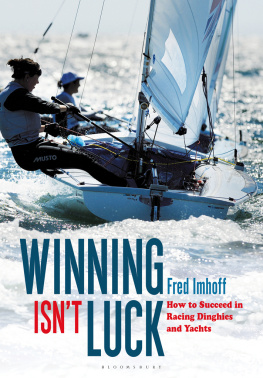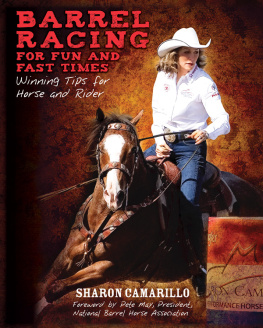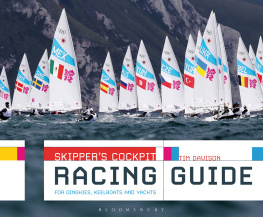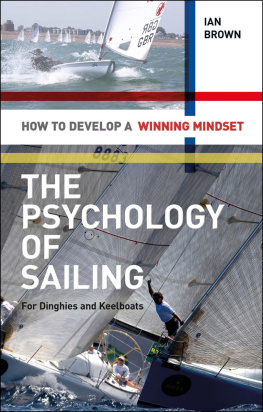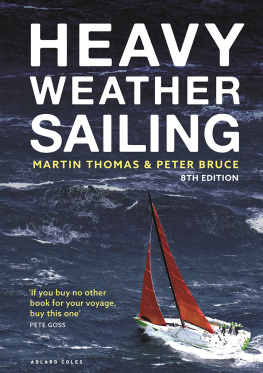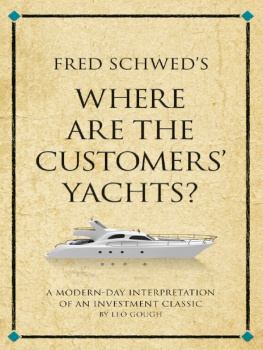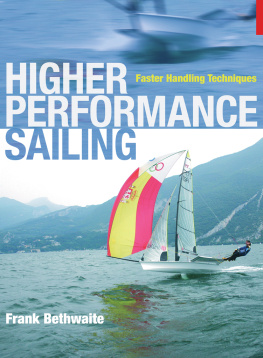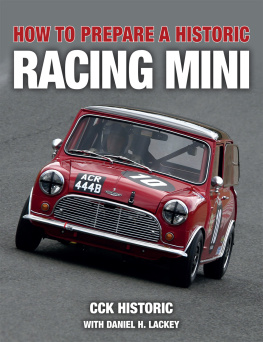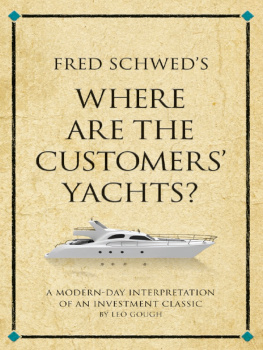
Adlard Coles Nautical
An imprint of Bloomsbury Publishing Plc
50 Bedford Square | 1385 Broadway |
London | New York |
WC1B 3DP | NY 10018 |
UK | USA |
www.bloomsbury.com
ADLARD COLES, ADLARD COLES NAUTICAL and the Buoy logo are trademarks of Bloomsbury Publishing Plc
This electronic edition published in 2016 by Bloomsbury Publishing Plc
Fred Imhoff 2014, 2016
illustrations Henk Plaatje 2014
photographs Thom Touw 2014
Hollandia Publishers, Haarlem, The Netherlands; a division of the Gottmer Uitgeversgroep BV 2014
Originally published under the title: Winnen is geen geluk
First published in English by Adlard Coles Nautical in 2016
English translation Chris Schram 2016
Fred Imhoff has asserted his right under the Copyright, Designs and Patents Act, 1988, to be identified as Author of this work.
All rights reserved
You may not copy, distribute, transmit, reproduce or otherwise make available this publication (or any part of it) in any form, or by any means (including without limitation electronic, digital, optical, mechanical, photocopying, printing, recording or otherwise), without the prior written permission of the publisher. Any person who does any unauthorised act in relation to this publication may be liable to criminal prosecution and civil claims for damages.
British Library Cataloguing-in-Publication Data
A catalogue record for this book is available from the British Library.
Library of Congress Cataloguing-in-Publication data has been applied for.
ISBN: PB: | 978-1-4729-2246-5 |
ePDF: | 978-1-4729-2609-8 |
ePub: | 978-1-4729-2608-1 |
Note: while all reasonable care has been taken in the publication of this book, the publisher takes no responsibility for the use of the methods or products described in the book.
Photographs by Thom Touw, Jan Faber, Eric van Staten, Ineke Schipstra and Ben Rutte
The following photographs are Thom Touw:
Note: For ease of reading, unspecified people are referred to as he' or 'him' throughout this book.
However, the person concerned could equally be female or male.
To find out more about our authors and books visit www.bloomsbury.com. Here you will find extracts, author interviews, details of forthcoming events and the option to sign up for our newsletters.
introduction
SAILBOAT RACING IS THE MOST COMPLEX SPORT AROUND AND LIFE IS FAR TOO SHORT TO EVER FULLY MASTER IT. I WROTE THIS BOOK TO SAVE YOU TIME ON THE LONG ROAD TO BECOMING A SUCCESSFUL COMPETITION SAILOR, AND ESPECIALLY TO SPARE YOU FROM HAVING TO REINVENT THE WHEEL SOMETHING THAT WOULD COST AN AWFUL LOT OF MONEY AND TAKE A LONG TIME.
Therefore you will not find tedious theories and exhausting descriptions of complicated details here, but instead clear descriptions of the most important elements of racing, and how to use them as quickly as possible to improve your results.
I will only focus on the knowledge youll need to be able to make the right decisions in different situations and leave out anything irrelevant to racing. Thus, useless information transfer is avoided and more time can be spent on the things that can directly contribute to your racing success.
For example, the tides are caused by the gravitational force of the moon. Is this knowledge useful in racing? No! Therefore, just accept the tides as they are. When the tide turns, the wind changes in force and/or direction. Is that useful for sailors to know? Yes! It is important to know how this happens so that we can predict it and use it to our advantage.
Whether dealing with dinghies or keel boats, short upwind/downwind courses or offshore races, the topics addressed in this book apply to all types of sailing, although priorities may differ. So the most important thing is to learn a certain way of thinking; to approach everything logically; and to prioritise and weigh different aspects objectively. Everything about competition sailing is logical, but its still complicated because there are so many factors to take into account.
Good or bad luck has very little to do with any of this. Its a question of missed signs and misinterpreted signals and these stem from a lack of knowledge. Most sailors have their own ways of prioritising, but they tend to fall back on their strengths. They may excel in strategy, sail trim, meteorology, the racing rules or the use of instruments because they enjoy or are good at that, but they tend to neglect other aspects because they find them difficult or dont like them as much. Try to keep everything in perspective and learn more about the topics youre less good at. To win you need to excel in everything, including the things you dont enjoy as much.
Because the sport is so complicated, you have to eliminate as many irrelevant details as possible and try not to get totally wrapped up in the nitty-gritty of speed and equipment. You dont need to be faster than the others; matching their speed is enough. You just need to sail better, make fewer mistakes and take advantage of other peoples mistakes because everyone will make them.
I would like to thank my old marine engineering study mate and sailboat racer in heart and soul, Lex Keuning, without whose help I could never have explained the workings of sails as clearly. He also corrected errors and made improvements with his precise editing. Many thanks also to Henk Plaatje, for whom it was no trouble at all to add little details or make changes to the images to achieve optimal results, and Thom Touw, whose vast archive provided the most fantastic photos to choose from.
Fred Imhoff


establishing priorities
FUNDAMENTALLY, YOU CAN DRAW ALL ASPECTS OF SAILBOAT RACING AS A BIG UMBRELLA START WITH THE MAIN SUBJECTS, AND THEN SUBDIVIDE THESE FURTHER. THE DIAGRAMS ON PAGES 10 AND 11 DEPICT THIS BIG UMBRELLA. AS AN EXAMPLE, LET US FURTHER EXPLORE THE TOPIC UPWIND SAIL TRIM. THIS TOPIC ALONE CAN BE SUBDIVIDED INTO:
Genoa luff tension
Genoa fairlead position
Barber hauler position
Genoa sheet tension
Forestay tension
Mainsail foot tension
Mainsail cunningham eye position
Sail batten stiffness
Backstay tension
Running backstay tension
Genoa and/or mainsail leech lines
Position of the traveller car
Boom vang tension
Mast bend
Angle of the spreaders
Upper shroud tension
Lower shroud tension
Pre-bend at deck level
If we further subdivide each of these topics, we end up with an overwhelming number of trim combinations, so the chances of selecting the ideal combination under different circumstances become negligible. As I said before, life is too short, especially when you are not a professional and you are sailing in a class with many trimming options. Soon it will become a matter of luck if you ever reach a reasonable combination of all these factors. Once you realise this, youll benefit from teaching yourself a logical way of thinking and establishing priorities. In the following chapters key aspects of sailboat racing will be covered, where I will further explain and apply this process.
Next page
